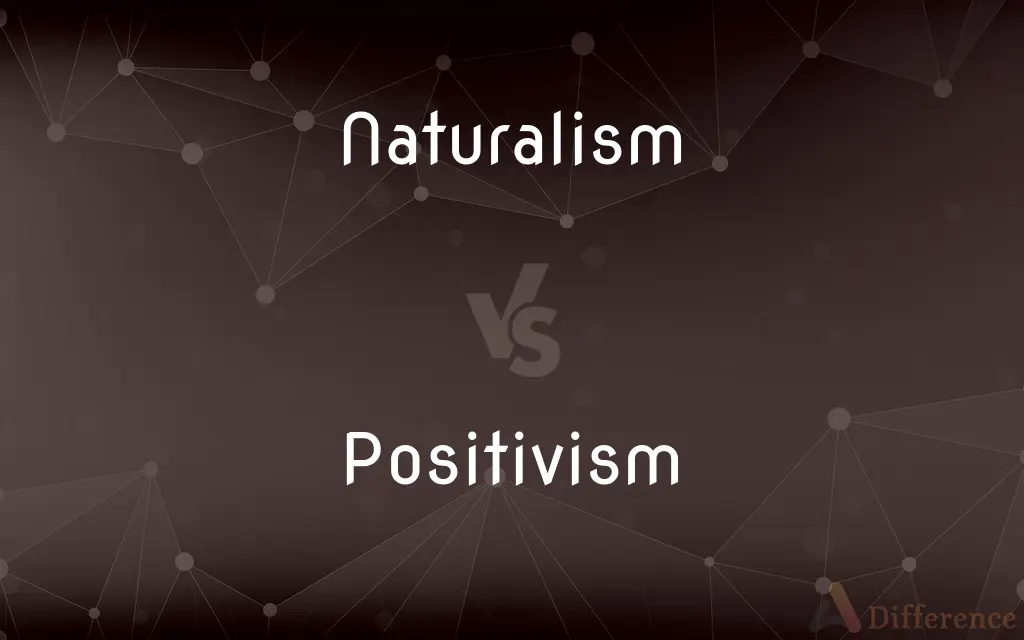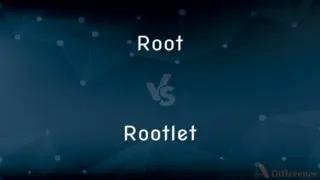Naturalism vs. Positivism — What's the Difference?

Difference Between Naturalism and Positivism
ADVERTISEMENT
Compare with Definitions
Naturalism
(in art and literature) a style and theory of representation based on the accurate depiction of detail
His attack on naturalism in TV drama
Positivism
Positivism is a philosophical theory that holds that all genuine knowledge is either positive—a posteriori and exclusively derived from experience of natural phenomena and their properties and relations—or true by definition, that is, analytic and tautological. Thus, information derived from sensory experience, as interpreted through reason and logic, forms the exclusive source of all certain knowledge.Verified data (positive facts) received from the senses are known as empirical evidence; thus positivism is based on empiricism.Sociological positivism holds that society, like the physical world, operates according to general laws.
Naturalism
The philosophical belief that everything arises from natural properties and causes, and supernatural or spiritual explanations are excluded or discounted
This romanticized attitude to the world did conflict with his avowed naturalism
Positivism
A doctrine contending that sense perceptions are the only admissible basis of human knowledge and precise thought.
Naturalism
The practice of describing precisely the actual circumstances of human life in literature.
ADVERTISEMENT
Positivism
The application of this doctrine in logic, epistemology, and ethics.
Naturalism
The practice of reproducing subjects as precisely as possible in the visual arts.
Positivism
The system of Auguste Comte designed to supersede theology and metaphysics and depending on a hierarchy of the sciences, beginning with mathematics and culminating in sociology.
Naturalism
A movement or school advocating such precise representation.
Positivism
Any of several doctrines or viewpoints, often similar to Comte's, that stress attention to actual practice over consideration of what is ideal
"Positivism became the 'scientific' base for authoritarian politics, especially in Mexico and Brazil" (Raymond Carr).
Naturalism
The principles and methods of such a movement or of its adherents.
Positivism
The state or quality of being positive.
Naturalism
(Philosophy) The system of thought holding that all phenomena can be explained in terms of natural causes and laws.
Positivism
(philosophy) A doctrine that states that the only authentic knowledge is scientific knowledge, and that such knowledge can only come from positive affirmation of theories through strict scientific method, refusing every form of metaphysics.
Naturalism
(Theology) The doctrine that all religious truths are derived from nature and natural causes and not from revelation.
Positivism
(legal) A school of thought in jurisprudence in which the law is seen as separated from moral values; i.e. the law is posited by lawmakers (humans).
Naturalism
Conduct or thought prompted by natural desires or instincts.
Positivism
A system of philosophy originated by M. Auguste Comte, which deals only with positives. It excludes from philosophy everything but the natural phenomena or properties of knowable things, together with their invariable relations of coexistence and succession, as occurring in time and space. Such relations are denominated laws, which are to be discovered by observation, experiment, and comparison. This philosophy holds all inquiry into causes, both efficient and final, to be useless and unprofitable.
Naturalism
A state of nature; conformity to nature.
Positivism
The form of empiricism that bases all knowledge on perceptual experience (not on intuition or revelation)
Naturalism
The doctrine that denies a supernatural agency in the miracles and revelations recorded in religious texts and in spiritual influences.
Positivism
A quality or state characterized by certainty or acceptance or affirmation
Naturalism
(philosophy) Any system of philosophy which refers the phenomena of nature as a blind force or forces acting necessarily or according to fixed laws, excluding origination or direction by a will.
Naturalism
(philosophy) A doctrine which denies a strong separation between scientific and philosophic methodologies and/or topics
Naturalism
(arts) A movement in theatre, film, and literature that seeks to replicate a believable everyday reality, as opposed to such movements as romanticism or surrealism, in which subjects may receive highly symbolic or idealistic treatment.
Naturalism
(nonstandard) naturism, nudism, social nudity.
Naturalism
The belief in natural law.
Naturalism
A state of nature; conformity to nature.
Naturalism
The doctrine of those who deny a supernatural agency in the miracles and revelations recorded in the Bible, and in spiritual influences; also, any system of philosophy which refers the phenomena of nature to a blind force or forces acting necessarily or according to fixed laws, excluding origination or direction by one intelligent will.
Naturalism
The theory that art or literature should conform to nature; realism; also, the quality, rendering, or expression of art or literature executed according to this theory.
Naturalism
The principles and characteristics professed or represented by a 19th-century school of realistic writers, notably by Zola and Maupassant, who aimed to give a literal transcription of reality, and laid special stress on the analytic study of character, and on the scientific and experimental nature of their observation of life.
Naturalism
(philosophy) the doctrine that the world can be understood in scientific terms without recourse to spiritual or supernatural explanations
Naturalism
An artistic movement in 19th century France; artists and writers strove for detailed realistic and factual description
Share Your Discovery

Previous Comparison
Root vs. Rootlet
Next Comparison
Cladding vs. Gladding













































